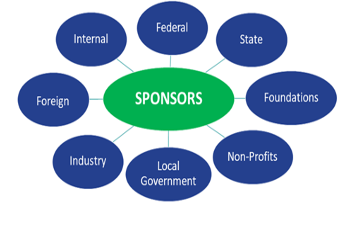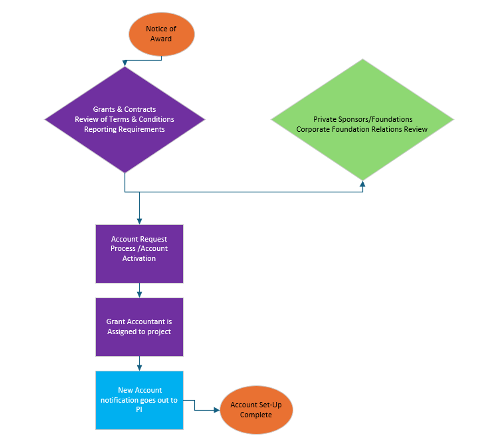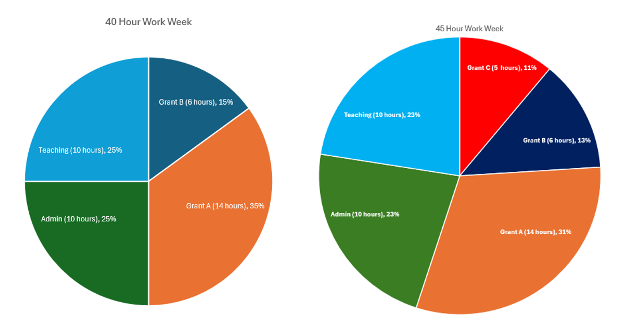Post-Award Guidelines
Post-Award Guidelines

New Award Set-Up
The UTRGV Office of Grants and Contracts is responsible for the review and account set-up of all new awards and cost share accounts. The Grants and Contracts Office is also responsible for the pre-audit of all sponsored project expenses over $3,000 as well as all proposed travel and personnel charges on grant accounts.
Who is the Signing Official?
The Associate Vice President for Research Operations and the Senior Vice President for Research and Dean Graduate College are the delegated signing officials for any program and research agreements.
Award Transfers
The grant transfer begins at the Institution the PI is leaving. It is the responsibility of the PI to initiate the transfer process. Prior to changing institutions, the PI must notify granting agency and exiting institution. The process to transfer awards (Relinquishing Statement to new NOA) to the new institution can take anywhere from 2-3 months.
What is the timeline for award set-up?
The process to set-up an award requires an internal review process that may take from 1-2 weeks to complete. The New Award Checklist (NAC) will need to be completed by the PI to begin the process.
PI Responsibilities
It is the responsibility of the Principal Investigator to adhere to all award terms and conditions, as well as applicable federal, State of Texas, Board of Regents, and university regulations that govern such activities.

Post-Award Budget Revisions and Modifications
All proposed changes to an award budget must adhere to the terms and conditions of the sponsor.
For NIH awards re-budgets that require Grants and Contracts and/or Sponsor approval:
- Change of Key Personnel
- Reduction of salary/effort
- Change of Scope
- Change in equipment costs
- Addition of foreign travel
- Change greater than 25% of budget item
- Change in Participant Support
Managing Compensation on Sponsored Projects
Calculating Effort is not based on a 40 hour work week

Managing compensation on sponsored projects involves review of proposed salary charges to a project. Charges should be reasonable, allowable, and accurately reflect actual effort expended by each employee. In some cases, charging effort to a grant may require a reduction in effort to non-sponsored activity, an increase in total work hours and a reduction in the level of effort on existing grant activities (seek sponsor approval as necessary) or a decrease in effort on a grant that requires sponsor prior approval.
For NIH awards, NIH prior approval is necessary for any reduction of effort of 25% or more from the level that was approved at the time of the initial competing year award.
- Examples of Institutional Activities
- Conducting Research
- Writing proposals
- Instruction
- Advising Students
- Supervising employees
- Serving on internal committees
- Attending required trainings
- Clinical Activity
- Administrative Assistance
- Calculating Effort
- Reasonable estimate
- Total effort must equal 100%
- Not based on a standard 40 hour work week
- Does not include outside activities
Facilities & Administration / Indirect Cost Rate Agreement
48% On Campus All Program
26% Off Campus All Programs
*Base
Modified total direct costs, consisting of all direct salaries and wages, applicable fringe benefits, materials and supplies, services, travel and up to the first $25,000 of each sub-award (regardless of the period of performance of the sub-award under the award). Excludes equipment, capital expenditures, charges for patient care, rental costs, tuition remission, scholarships and fellowships, participant support costs and the portion of each sub-award in excess of $25,000. Effective 10/1/24 IDC charged on subawards will increase to the first $50,000.
Indirect Cost Agreement (IDC)On-Time Reporting
Audit
If an institution expends more than $750,000 in federal funds in one year, a single audit is required annually. The single audit is a comprehensive examination of the organization’s financial statements. Auditors will check that all guidelines are being followed and that grant funds are properly documented and recorded according to generally accepted accounting
Time and Effort Reporting
The 2 CFR 200.430 Uniform Guidance, establishes standards for time reporting and labor charges to federal awards. Grantees must comply, requiring all employees paid with federal funds to maintain time distribution records. At UTRGV the Office of Grants and Contracts is responsible for facilitating Time and Effort Certification or Effort Reporting.
Electronic Certification Reporting Technology (ECRT) is the reporting system currently in use at UTRGV. https://utss-ecrt.utsystem.edu/ecrt/
Reference guide to Time and Effort Certification
Reporting periods are as follows
Fall semester- Sept. 1st to December 31st.
Spring semester- January 1st to April 1st
Summer- May 1st to August 31st
